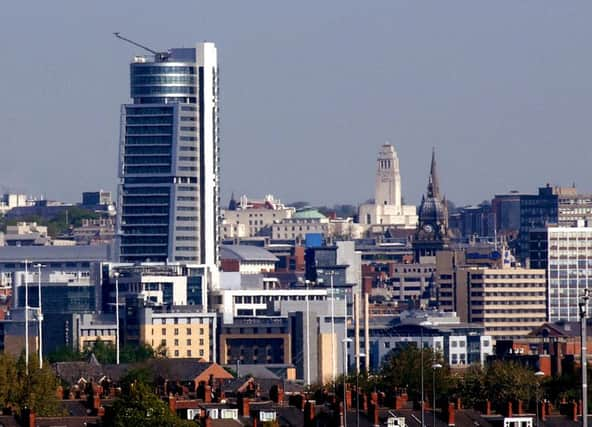Leeds' housing market enjoys 'strong, steady growth' says study


The latest Hometrack UK Cities House Price Index predicts that above average house price increases in large regional cities like Leeds will offset low nominal growth in London.
In Leeds, the average house price in November 2016 was £155,100, which was a year-on-year increase of 6.2 per cent, according to the research from Hometrack, which provides data that is used by property professionals.
Advertisement
Hide AdAdvertisement
Hide AdHouse sales in Leeds in 2016 are expected to have risen by 6.7 per cent, which is the second highest rate in the UK, said Hometrack.
Leeds is joint second with Nottingham in Hometrack’s table. The city with the highest increase in the number of sales is Leicester, which is expected to have seen a 7.3 per cent rise in house sales this year.
The latest Hometrack UK Cities House Price Index reveals that house price growth in London has fallen to 7.6 per cent, the lowest level for 39 months, as affordability pressures and multiple policy changes aimed at investors weaken demand.
The overall headline rate of inflation for the UK Cities House Price Index is currently running at 7.7 per cent, which is marginally higher than the 7.3 per cent recorded 12 months ago, and in line with Hometrack’s projection for seven per cent capital value growth over 2016.
Advertisement
Hide AdAdvertisement
Hide AdTransaction volume growth over 2016 is expected to range from +8 per cent to -10 per cent, which reflects varying underlying market conditions across the UK, Hometrack said.
A Hometrack spokesman said: “The cities where house prices are now decelerating after five years of high growth, such as London, Oxford, Bournemouth, Bristol and Cambridge, are set to record a five per cent contraction in sales in 2016. In addition to this, Aberdeen, which is continuing to see house price falls (-6.4 per cent per annum) is also expected to see a similar shift in activity.
“In contrast, cities registering sustained growth in house prices are the ones expected to record higher turnover over 2016, with the greatest uplift likely in Birmingham, Leeds, Leicester and Nottingham.”
Richard Donnell, the insight director at Hometrack, said: “In London and southern cities homeowners are facing the greatest affordability pressures, while the buoyant investor market has been impacted by fiscal changes, as well as tougher underwriting standards for mortgage borrowers. In larger regional UK cities, such as Birmingham and Manchester, affordability remains attractive and we believe there is room for further price growth over 2017.
Advertisement
Hide AdAdvertisement
Hide Ad“With this in mind, we predict that city level house price growth in 2017 will run slightly higher than the current consensus of two to three per cent, however this will largely be driven by the scale of the slowdown in London.”
Hometrack expects weaker growth in real household incomes, and concerns over the impact of Brexit on the economy, to weigh on housing market sentiment, particularly in southern England.
The Hometrack report says: “While the economy is projected to grow in 2017, levels of employment are forecast to grow more slowly although mortgage rates are expected to remain low by historic standards.
“Given the current projections for the economy, we do not believe that any of the cities covered by the index will be registering year on year price falls at the end of 2017. However, we do expect the rate of city level house price growth to slow over the next 12 months led by weaker growth in cities across southern England.”